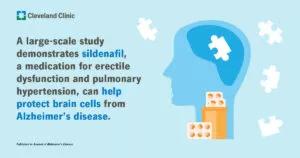Large-scale study provides evidence that FDA-approved drug can help protect brain cells from Alzheimer’s disease


Image content: This image is available to view online.
View image online (https://assets.clevelandclinic.org/transform/8e4329c6-b3a5-40e0-ad0c-516c5d290783/cheng-phd-lab-research)
Feixiong Cheng, Ph.D.
New Cleveland Clinic-led research points to sildenafil (Viagra) as a potential treatment for Alzheimer’s disease. The study provides evidence from computational models, insurance claims data and observations from brain cells in Alzheimer’s patients.
Sildenafil is the main component of drugs used to treat erectile dysfunction (Viagra) and pulmonary arterial hypertension (Revatio).
“Our findings provide further weight to re-purposing this existing FDA-approved drug as a novel treatment for Alzheimer’s, which is in great need of new therapies,” said Feixiong Cheng, Ph.D., who led the research. “We used artificial intelligence to integrate data across multiple domains which all indicated sildenafil’s potential against this devastating neurological disease.”
Alzheimer’s disease currently affects over 6 million Americans and incidence is expected to triple by 2050, underscoring the need for rapid development of new prevention and treatment strategies. Drug repurposing – use of an existing drug for new therapeutic purposes – offers a practical alternative to the costly and time-consuming traditional drug discovery process.
Published in Journal of Alzheimer’s Disease, the study builds upon the researchers’ earlier findings in 2021 that used computational models to initially identify sildenafil as a promising drug candidate to help prevent and treat Alzheimer’s disease.

Image content: This image is available to view online.
View image online (https://assets.clevelandclinic.org/transform/75acbfb8-f359-4a95-944c-34317ddec53f/24-CCC-4670715-Sildenafil-for-Alzheimers-Disease-FB-X-REV-300x158)
In the new study, Dr. Cheng, director of the Cleveland Clinic Genome Center, and his team analyzed millions of de-identified insurance claims from two independent patient databases, which revealed a 30-54% reduced prevalence in Alzheimer’s disease diagnoses among patients who took sildenafil compared to those who did not after adjusting various possible confounding factors.
In brain cells from Alzheimer’s patients, researchers also showed that sildenafil lowers levels of neurotoxic tau proteins, which are known to be associated with Alzheimer’s disease when they build up. They also found that neurons treated with sildenafil expressed genes related to cell growth, improved brain function, reduced inflammation and other processes known to protect against the neural degeneration associated with Alzheimer’s disease.
Dr. Cheng’s findings demonstrate the feasibility of using computer models to identify potential new drug candidates in a fast, reliable way, representing a significant step forward in Alzheimer’s drug discovery.
“After integrating this large amount of data computationally, it is rewarding to see sildenafil’s effects in human neurons and real-world patient outcomes,” said Dr. Cheng. “We believe our findings provide the evidence needed for clinical trials to further examine the potential effectiveness of sildenafil in patients with Alzheimer’s disease.”
Dr. Cheng’s co-authors include Andrew A. Pieper, M.D., Ph.D., of Louis Stokes Cleveland VA Medical Center, Case Western Reserve University and University Hospitals Cleveland Medical Center; and Jeffrey Cummings, M.D., Sc.D., director emeritus of the Cleveland Clinic Lou Ruvo Center for Brain Health in Las Vegas.
Dhruv Gohel, Ph.D., and Amit Gupta, Ph.D., postdoctoral research associates in Dr. Cheng’s laboratory, are co-first authors. The study was primarily supported by the National Institute on Aging of the National Institutes of Health (NIH) under award numbers R01AG066707, U01AG073323, R01AG076448, R01AG082118, RF1AG082211, R01AG084250, R56AG074001, andR21AG083003, and the National Institute of Neurological Disorders and Stroke of NIH under award number RF1NS133812.
Cleveland Clinic is a nonprofit multispecialty academic medical center that integrates clinical and hospital care with research and education. Located in Cleveland, Ohio, it was founded in 1921 by four renowned physicians with a vision of providing outstanding patient care based upon the principles of cooperation, compassion and innovation. Cleveland Clinic has pioneered many medical breakthroughs, including coronary artery bypass surgery and the first face transplant in the United States. Cleveland Clinic is consistently recognized in the U.S. and throughout the world for its expertise and care. Among Cleveland Clinic’s 82,600 employees worldwide are more than 5,786 salaried physicians and researchers, and 20,700 registered nurses and advanced practice providers, representing 140 medical specialties and subspecialties. Cleveland Clinic is a 6,728-bed health system that includes a 173-acre main campus near downtown Cleveland, 23 hospitals, 280 outpatient facilities, including locations in northeast Ohio; Florida; Las Vegas, Nevada; Toronto, Canada; Abu Dhabi, UAE; and London, England. In 2024, there were 15.7 million outpatient encounters, 333,000 hospital admissions and observations, and 320,000 surgeries and procedures throughout Cleveland Clinic’s health system. Patients came for treatment from every state and 112 countries. Visit us at clevelandclinic.org. Follow us at x.com/CleClinicNews. News and resources are available at newsroom.clevelandclinic.org.
Editor’s Note: Cleveland Clinic News Service is available to provide broadcast-quality interviews and B-roll upon request.